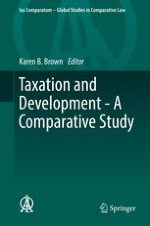Synopsis
Australia has historically been a capital importing country, but today there is significant investment by Australian companies abroad. Miranda Stewart notes that, although Australia does not generally provide tax incentives for investment abroad, its participation exemption regime, providing exempt income tax treatment for business profits returned to Australia, may be viewed as an incentive to invest offshore. However, the corporate-shareholder imputation credit claws back the benefit of the participation exemption for profits distributed to Australian shareholders. The imputation credit does not apply to dividends received from foreign corporations or from Australian corporations out of profits not subject to tax in Australia.
The participation exemption regime in Australia, effective since 2004, allows an exemption for active foreign business income of Australian resident corporations as well as for dividends received by Australian corporations from foreign subsidiaries actively engaged in a foreign business. It also provides an exclusion from tax for capital gains derived on the sale of shares of a foreign subsidiary (where ownership is at least 10 %). Stewart notes that this regime operates as a “true territorial system” when profits are retained offshore. If these profits are distributed to foreign shareholders, there is no further Australian tax on either the corporation or the shareholder. When these profits are distributed to Australian shareholders, as noted above, there is no imputation credit and the shareholder pays Australian tax on the dividend (although the actual amount of the dividend would be diminished by any foreign tax paid by the distributing corporation – in effect allowing the shareholder a deduction for any foreign tax paid).
The participation exemption, buttressed by anti-avoidance rules with differing levels of success, does provide some incentives to invest in developing countries hoping to use various incentives to attract foreign investment. The regime was also intended to support inbound investment into Australian companies.
Most Australian outbound investment is into the United States and United Kingdom. Australian outbound investment in developing countries has been primarily in the BRICS (China, Brazil, India, Russia, and South Africa), Mexico and the ASEAN region (Hong Kong, Indonesia, South Korea, Malaysia, Philippines, Singapore, Taiwan, Thailand, and Vietnam) and tax havens, including the Bahamas, Bermuda, Cayman Islands and British Virgin Islands. There is very little outbound investment into Latin and South America (other than Brazil), Africa, the Pacific, Middle and Eastern Europe.
Historically, Australia has alternated between a territorial system in which foreign source income was exempt from tax and a worldwide system. Australia currently has a worldwide system taxing residents on income from all sources whether inside or outside Australia and allowing a foreign income tax offset (FITO) for taxes paid to another country on foreign source income, except for the corporate business profit participation exemption described above.
Australia has 45 double tax agreements (DTAs) with OECD countries, EU nations, and certain other countries, such as Argentina, Chile, China, Fiji, India, Indonesia, South Korea, Malaysia, Papua New Guinea, Singapore, Philippines, Thailand, Turkey, and Vietnam. Although Australia has negotiated treaties with developing countries which are significant trading or investment partners, it does not use them as a tool for international aid and development policy. Australia had in the past provided tax sparing in all of its DTAs with developing countries. It discontinued that practice in light of the OECD 1998 decision to urge abandonment of this practice among member nations. The current Australia-Papua New Guinea (a former colony) DTA does contain a tax sparing provision, which allows Australian residents to benefit from a tax exemption for investment in that jurisdiction.
Australia relies on its Controlled Foreign Corporation (CFC) rules to prevent avoidance of tax on passive-type income, but, apart from this, it has no special rules that target investment in tax havens. It relies upon its treaty-based information exchange provisions and its General Anti-Avoidance Rules (GAAR) to deny treaty benefits in cases of abuse.
Australia is party to numerous free trade and bilateral trade agreements. For the most part, these have limited application to income tax measures.
